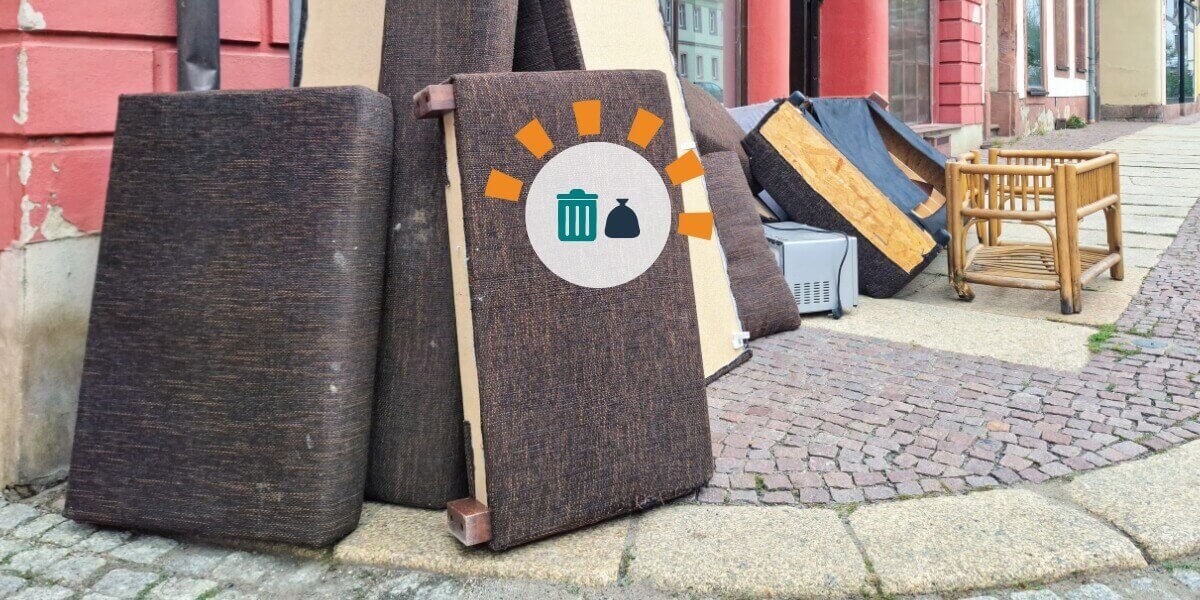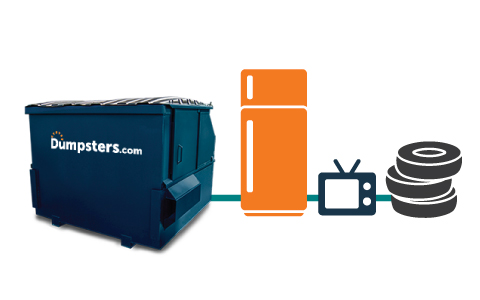How to Properly Dispose of Trash
Whether you’re clearing out clutter, replacing old furniture or dealing with renovation debris, there are simple ways to get rid of unwanted items responsibly. Use this guide to learn the best disposal methods for common types of waste.
Get exact pricing on dumpsters in your area.

Getting Rid of Garbage the Right Way
Proper trash disposal matters. It safeguards our communities, preserves the environment and even saves you money. Improperly disposing of trash often comes with hefty fees — but don't fret. We've got you covered with a comprehensive disposal guide for those tricky waste items.

Frequently Asked Questions: Getting Rid of Trash
Where can I get rid of trash?
It depends on the type of trash you're tossing and where you live. Local regulations vary from place to place, but you can take most kinds of waste to your local landfill or transfer station.
What kind of landfill should my trash go to?
There are four different types of landfills waste can go to — municipal solid waste (MSW), industrial (C&D), hazardous waste and green waste landfills.
You can take most common household trash to your local MSW landfill, while construction and remodeling debris should go to a C&D landfill.
Hazardous waste landfills often have strict regulations, so be sure to reach out before dropping off hazardous materials. Not all areas have green waste landfills, so if you have organic waste to toss, contact your local municipality or search online to find the best option near you.
How can I get my trash to the landfill?
To get trash to a landfill, you have a few options:
- Leave It at the Curb: Local trash services take most kinds of household waste. If you have a large amount of trash, you may have to request bulk pickup or wait until the next scheduled bulk pickup day. Keep in mind that city garbage services have their limits. If you have too much trash, they may only take a portion of it and leave the rest for their next pickup.
- Take It to the Landfill Yourself: You can usually haul trash to the landfill yourself, where you'll pay a per-pound disposal fee. Some landfills only allow drop-off on specific days, so be sure to call ahead or check their website for details. Other landfills schedule free disposal events on a monthly or quarterly basis. If you're planning a major cleanout, try timing it around your landfill's free dump days.
- Rent a Dumpster: If you have a large amount of trash and need to clear it quickly, renting a dumpster can be a great option. When you order a roll off dumpster, a truck will deliver it to your driveway, street or parking lot. Because you can hang onto a dumpster for a week or more, this is a great solution for multi-day or even multi-week projects that generate a lot of waste. There are several roll off dumpster sizes to choose from, depending on how much garbage you need to clear.
Remodeling or Construction Debris
You should generally dispose of construction and remodeling debris in a roll off dumpster. This includes materials like drywall, concrete, flooring, shingles and lumber. While you can leave some of these items at the curb in small quantities, renting a roll off dumpster is best for most home remodeling projects.
Find the right disposal guide for your construction debris below:
Mattresses
You have a few options when disposing of a mattress: curbside bulk collection, donation or a mattress recycling service. You may also be able to put your mattress in a roll off dumpster, depending on the rules at your local landfill. While mattresses aren’t harmful to the environment, some landfills do not accept them due to their size.
Electronic Waste
To dispose of e-waste, take it to an e-waste recycler or drop it off at an electronics store that offers recycling. E-waste includes all electronic items, such as cellphones, laptops, tablets and televisions. Due to the toxic materials inside many electronics, it's important to separate them from regular household waste and follow all disposal regulations.
Appliances
There are several disposal options for appliances: curbside bulk collection, donation or a trade-in program through your power company. Appliances that contain Freon — like refrigerators and air conditioning units — must undergo proper refrigerant drainage before going in a dumpster rental.
Tires
You can typically recycle tires through a local auto shop or place them at the curb during your city's curbside bulk collection events. Landfills usually do not accept tires, making them a prohibited item for most dumpsters.
Hazardous Materials
Dispose of hazardous materials at your city or county’s household hazardous waste facility. Hazardous waste includes fuels, oils, car batteries and other items that contain lead, paint and various chemicals. Never place these materials in your garbage can or dumpster rental as they may cause a fire or pollute the environment.
Medical Waste
Bring medical waste to a dedicated medical waste disposal service or a DEA-authorized drop-off location. Medical waste includes needles, unused medication, a variety of home health apparatuses and materials that have come in contact with blood, bodily fluids or infectious matter. Due to the health risks involved, never dispose of this waste in your garbage can, roll off dumpster or by pouring it down a drain.
More Trash Disposal Resources
Still looking for a better way to get rid of trash? Check out the following dumpster and waste disposal resources below.
